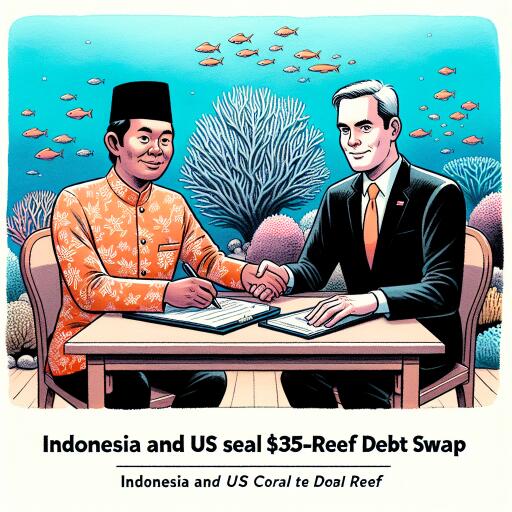
Indonesia and US Enter a Groundbreaking $35M Coral Reef Preservation Deal
In a monumental stride for environmental conservation, Indonesia and the United States have unfolded a novel chapter in their fight against global climate impact on marine biodiversity. The two nations have come together in a pioneering agreement, with the US set to reduce Indonesia’s debt by $30 million over the forthcoming nine years. This reduction in debt is not without its purpose; it serves as a commitment by Indonesia towards the restoration and conservation of its coral reefs, the biodiversity of which is unrivaled globally.
The peril facing coral reefs worldwide is escalating, attributed largely to the adverse effects of climate change. With sea temperatures on the rise, the phenomenon of coral bleaching is becoming ever more prevalent, posing a significant risk to these marine ecosystems. This agreement marks the latest venture in a series of ‘debt-for-nature’ swaps between Indonesia and the US, aiming to channel funding into conservation efforts over at least a 15-year span.
The focus of the conservation initiatives will be on two crucial areas within the so-called ‘Coral Triangle’—the Bird’s Head Seascape and the Lesser Sunda-Banda Seascape. Spanning vast expanses of marine habitat, these areas are home to the majority of the world’s coral species and an astonishing variety of over 3,000 fish species, along with turtles, sharks, whales, and dolphins. The pressing need for conservation in these areas has never been more critical, as coral bleaching events continue to devastate global reef ecosystems.
With Indonesia’s coral reefs comprising 18% of the global total, the stakes for the nation and the broader international community are high. Previous debt-for-nature swaps have seen nearly $70 million funneled into Indonesia’s environmental conservation projects. However, this recent agreement shifts the focus specifically to the preservation of coral reefs for the first time, highlighting the pressing challenges facing these vital ecosystems due to global warming and the resulting increase in greenhouse gas emissions.
The structure of this agreement involves erasing $26 million of Indonesia’s debt under the U.S. Tropical Forest and Coral Reef Conservation Act. Added to this, Conservation International and The Nature Conservancy, organizations instrumental in orchestrating such swaps, will contribute a combined $4.5 million towards the cause. This initiative not only aims at environmental restoration but also at supporting sustainable livelihoods for local communities reliant on these ecosystems.
This deal embodies the understanding that the fight against environmental degradation, especially in the context of coral reefs, requires global cooperation. Coral reefs, often described as the rainforests of the sea, play a critical role in maintaining marine biodiversity. They provide habitat and breeding grounds for numerous marine species, besides offering protection for coastlines and supporting local economies through tourism and fishing.
The innovative approach of using debt forgiveness as a tool for environmental preservation offers a ray of hope for coral reefs in Indonesia and sets a precedent for similar conservation efforts worldwide. It demonstrates a commitment to breaking the detrimental cycle of financial strain leading to ecological compromise, paving the way for a future where economic and environmental sustainability go hand in hand.





Leave a Reply